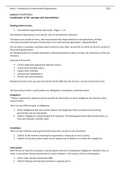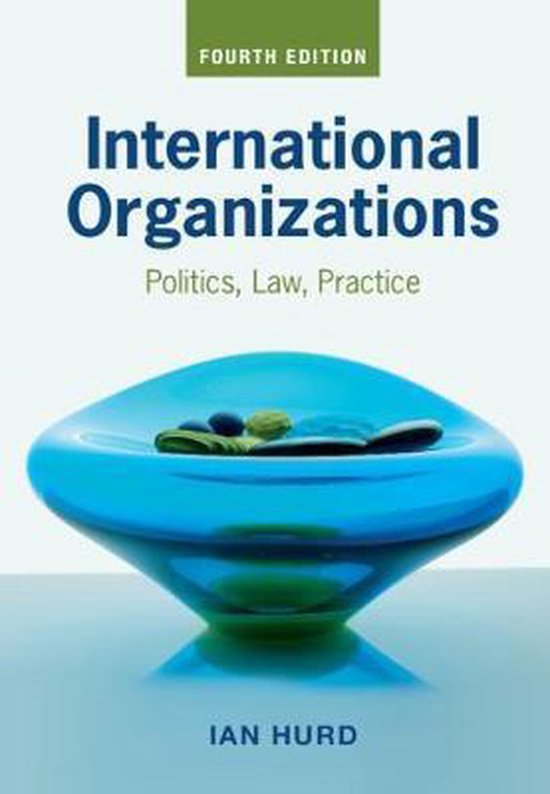Notes – Introduction to International Organisations 2022
Lecture 1: 05/09/2022
Introduction to IOs: concepts and characteristics
Readings before lecture:
1. International Organizations (Ian Hurd) – Pages 1 – 15
International Organisations are a specific class of international institutions.
'Institutions are a body of norms, rules and practises that shape behaviour and expectations, without
necessarily having the physical characteristics of an international organisation.' (Heywood 2014)
IOs are built on a paradox: sovereign states commit to each other, but the IOs are there to limit the choices of
those same governments.
As interdependence (a mutually dependent relationship) between states increases, the importance of IOs also
increases.
Features of formal IOs:
▪ Formal treaty base (agreement between states),
▪ at least three member states,
▪ regular state meetings,
▪ bureaucracy/ headquarters,
▪ formal rules and procedures.
Besides formal IOs, there are also informal IOs (G7 & G20): they do not have a structure like formal ones.
The three forces of IOs in world politics are: Obligations, Compliance, and Enforcement.
Obligations
"Treaties" (agreements between parties) provide the information on which obligations the member states
need to follow.
There are two different types of obligations:
1. Direct: Obligations that were written down in the beginning. These are known by the joining
government and are anticipated.
2. Indirect: Obligations arising during the IO operation. The joining government did not know these, as
they were already a member state.
Compliance
There are two moments where governments show their consent in and around IOs:
1. Explicit: At the moment of joining the organisation / saying yes or no to a policy.
2. Implicit: At the point where states see the opportunity to follow or to violate their obligations.
Enforcement
Most IOs do not have the real power to punish governments for violating their obligations. Members face, at
most, a very indirect threat of punishment for their violations – for instance, the loss of reputation.
1. Direct: Clear sanction mechanism (IMF)
2. Indirect: Naming and shaming mechanism, exposing actors
,Notes – Introduction to International Organisations 2022
Sovereignty and Consent
States are sovereign because they are not subject to any higher political or legal authority. Only the
government can enforce laws in their domestic territories, and any party that wants to apply their laws in
other states does so illegally.
In reality, governments do many things in their sovereign right and impact other states, such as a higher
interest rate. That is why a good deal of the work of IOs arises because of such arguments. Nonintervention is
a term often used in a military sense but is far more complex in the political field.
Categories to differentiate IOs – characteristics
1. Membership:
Universal: every state can become a member (UN)
Limited/ regional: only some states can become a member (EU)
2. Competence:
Comprehensive/ general purpose: IO deals with various topics (UN)
Limited/ issue-specific: IO focuses on a specific theme (WTO)
3. Function:
Rule-making Organisation: makes policy and sets rules (UN – can make its policy)
Operational organisations: executes policy (IAEA – the member states set rules)
4. Decision-making authority:
Intergovernmental: decisions are taken by all member states based on horizontal authority (NATO)
-> pooled sovereignty (member states decide with each other)
Supranational: decision taken by an organisational body designated by member states based on
vertical authority, the body is then over the states (EU)
-> delegated sovereignty (decisions taken by independent body)
,Notes – Introduction to International Organisations 2022
Three views on the role of IOs in world politics
IOs as Actors
IOs are constituted by international law as independent entities, legally distinct from the states that make
them up as their founders and their members, much like a business corporation is different from its employees
and owners. IOs have legal standing, with certain rights and obligations, and can sue and be sued (ICJ 1949).
To be viewed as an actor, IOs need to be understood by the international community as actors, and their
decisions must impact that community. To see if an IO is an independent actor, you need to look if it can do
things which its members on their own are unable to do.
IOs as Fora (plural of forum)
International organisations are placed in buildings, conferences and meetings. In this sense, IOs are a meeting
point for different actors, such as states, to discuss interests and problems of mutual concern. The
contribution to these events comes from publicity, logistical support and legitimation.
In addition, most IOs have a plenary body where states are present to discuss the direction the IO should go.
These bodies are also places where states that are not great powers can have some voice. Diplomats also meet
during these conferences and can discuss issues outside the plan.
IOs as Resources and Tools
Governments use the symbols, decisions, and statements of IOs as instruments in their strategies, and many
international disputes arise over competing attempts to deploy them.
Seeing IOs as tools in the hands of states rather than as solutions to global problems helps to empathise the
limits of their power and effectiveness. When states do not want IOs included in a solution, they can keep
them out of the issue.
IOs need to be viewed in all three senses (as an actor, forum and tool); when this is not done, it is too easy to
criticise or dismiss them. There is not one IO, which is only one thing of the three. For example, the UN GA is
more of a forum than the ICJ. Furthermore, many more technical IOs, such as the Universal Postal Union, are
much less helpful as resources than those with a higher political profile, such as the UN Security Council.
, Notes – Introduction to International Organisations 2022
Lecture 2: 09/09/2022
IOs and IR theory
Readings before lecture:
1. International Organizations (Ian Hurd) – Pages 16 – 41
The great debate:
- Why do states cooperate (create and join IOs)?
- What is the role of IOs in world politics (power of IOs)?
(Neo-) Realism
The international system is anarchic. Anarchy means that no superior/ supranational authority guides the
behaviour of states and the international system.
States are unitary actors:
All states have a core interest: To advance their power (economic and military sense). That is why Realists
might refrain from joining IOs because treaties might limit the superiority of the state.
That is why international politics should be understood as the pursuit of military dominance by states to
reduce their intrinsic sense of insecurity about other countries.
IOs are instruments for powerful/ hegemonic states to pursue their national interests (hegemonic stability).
States make cost benefit calculations and then decide whether it is wise to use an IO or not.
(Neoliberal) -Institutionalism and IOs
States are unitary actors (anarchic) but at the same time interdependent:
States operate and act inside a system in which their interdependence is characterised. That means that what
one state is doing affects other states.
IOs enable cooperation among states by reducing transaction costs.
- Different types of "cooperation games" (game theory).
States meet regularly, which reduces uncertainty (members increase their knowledge about the other
members and use that information for further negotiations).
States also can monitor different actors at a much lower cost through other IOs (delegation of tasks from
states to IOs).
Liberalism
States are seen as plural actors and not unitary.
- Domestic institutions (parliament, media, lobby groups, civil society, etc.) matter, as they can decide the
foreign policy.
Principal-agent theory: States get together and conclude a contract (IOs with a specific mandate), the agent
(IO) needs to have the power, to act in favour of the states, but it should not be too powerful.
Different types of governments have other desires (democracies versus autocracies).
States cooperate because of:
- Learning: states can learn from previous interactions and others and own mistakes
- Shared values (idealism): when states have the same values, they want to cooperate
- Economic interdependence: especially in democracies (the more trade, the less war)
- Global progress (IOs enhance global progress as the interdependence between states gets bigger)






